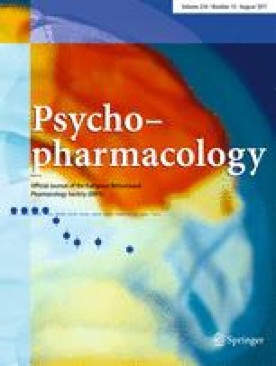A psychiatry journal has issued expressions of concern for four papers by a group of researchers in Russia after questions surfaced about the integrity of the data.
The first author on all of the papers was Ilya D. Ionov, of the Centre On Theoretical Problems in Physical and Chemical Pharmacology, part of the Russian Academy of Sciences in Moscow. The co-authors are affiliated with Timpharm LTD, a drug company without much in the way of an online presence.
The papers appeared in Psychopharmacology, a Springer Nature title.
Here’s the notice for “Anticataleptic activity of nicotine in rats: involvement of the lateral entorhinal cortex,” which Psychopharmacology published in 2021:
The Editor-in-Chief would like to alert readers that concerns have been raised regarding the data in this article (Ionov et al. 2021). Specifically, in Figs. 3–7, highly uniform data appear to be presented, including similar mean ± SEM values.
The corresponding author has been contacted to address these concerns and stated that the experimental procedures described in the article were designed to decrease data variability. However, the authors have not provided the raw data for validation. Therefore, readers are advised to interpret the results with caution.
Irina I. Pushinskaya, Nicholas P. Gorev, David D. Frenkel and Nicholas N. Severtsev have not responded to any correspondence from the editor or publisher about this Editorial Expression of Concern.
The paper has not yet been cited, according to Clarivate Analytics’ Web of Science.
The three other articles are:
- “Synergistic anticataleptic effect of imipramine and nicotine in a rotenone-induced rat model,” from 2019 (cited once);
- “Histamine- and haloperidol-induced catalepsy in aged mice: differential responsiveness to L-DOPA,” from 2012 (cited seven times)
- “Somatostatin antagonist induces catalepsy in the aged rat,” from 2012 (cited nine times)
We asked Ionov about the papers in question. He replied:
The essence of this question is the role of animal strains in the catalepsy experiments.
First, in all experiments we used Wistar rats whereas almost all other authors use Sprague Dawley rats. However, the latter strain is hardly suitable for catalepsy assays due to its high motor activity and high variability of the results. Meanwhile, Wistar rats are prone to catalepsy as it has been shown in the 1980s by Kolpakov VG (papers in Russian). In our experiments, Wistar rats demonsrate very stable cataleptic responses both to haloperidol and cyclosomatostatin. Obviously, just these rats should be used in catalepsy experiments.
Second, to decrease data variabily in catalepsy experiments, we in the first two days placed the rats on the bar daily to adapt the animals to experimental context; also, in each session, the immobility was measured three times and the mean of these three periods of motionlessness was accepted to be the outcome of this test. This experimental approach strongly decreases deviation of the results.
All these considerations have been submitted to Psychopharmacology but they have not been completely included in my explanations in the text of Concerns.
I think it is absolutely inappropriate in scientific discussion (if it is really scientific discussion) to reduce the explanations of one of the sides.
We also emailed the editor of the journal, who at first said he had no idea what we were talking about and then referred our questions to Springer Nature corporate communications. We wanted to know how and when the journal learned about the issues, who had raised them, and how long the publisher would give the authors before moving to retract the papers.
The response we got was attributed to Trevor Robbins, the “coordinating editor” of Psychopharmacology, and added nothing to the expressions of concern:
The Editors of Psychopharmacology became aware of concerns regarding the data in four articles1 which they then investigated in line with COPE guidelines. The corresponding author has responded to these concerns, but as the authors have not provided the raw data for validation, Editorial Expressions of Concern have been added to the four articles to advise readers to interpret the results with caution.
Our investigation is now concluded unless new information or concerns come to the attention of the Editors.
Like Retraction Watch? You can make a tax-deductible contribution to support our work, follow us on Twitter, like us on Facebook, add us to your RSS reader, or subscribe to our daily digest. If you find a retraction that’s not in our database, you can let us know here. For comments or feedback, email us at [email protected].

What does a ” Centre On Theoretical Problems in Physical and Chemical Pharmacology ” really do? Smoking pot all day long? Such a bombastic name.
Ok. Will go to Russia to investigate